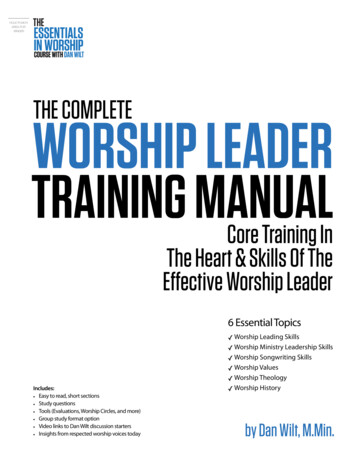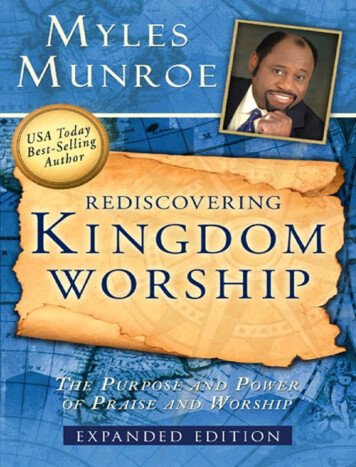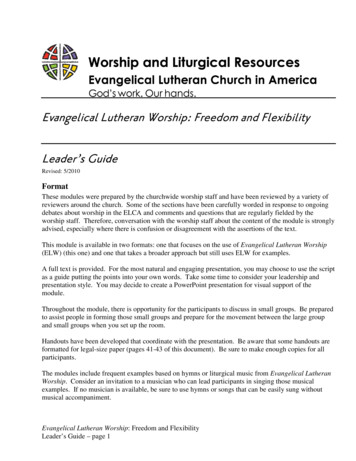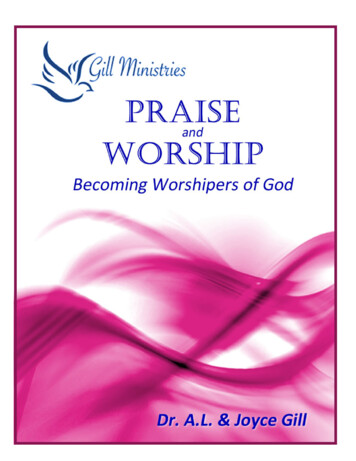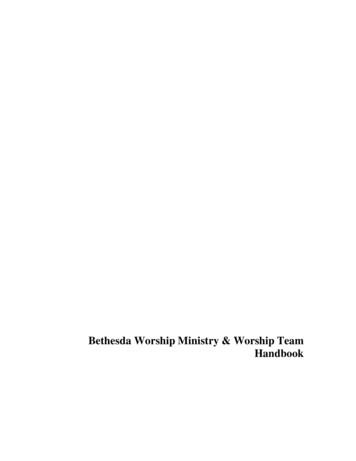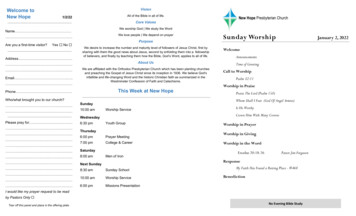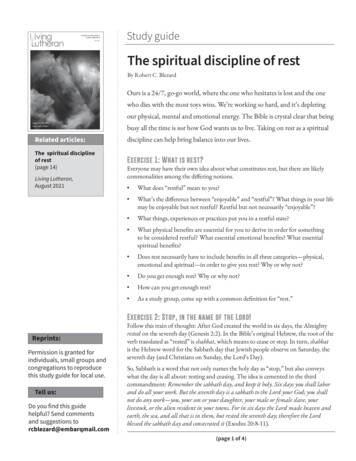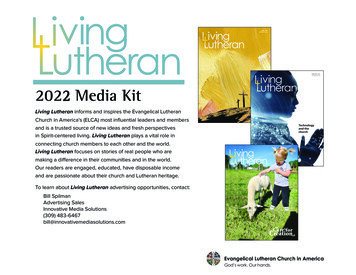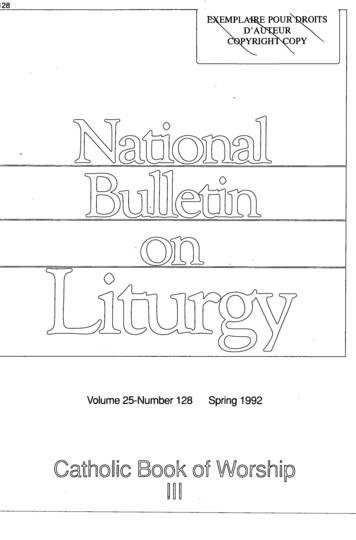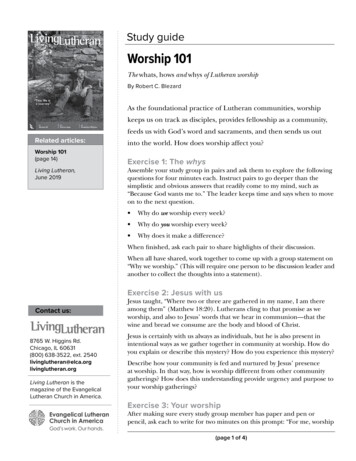
Transcription
Study guideWorship 101The whats, hows and whys of Lutheran worshipBy Robert C. BlezardAs the foundational practice of Lutheran communities, worshipkeeps us on track as disciples, provides fellowship as a community,Related articles:Worship 101(page 14)Living Lutheran,June 2019feeds us with God’s word and sacraments, and then sends us outinto the world. How does worship affect you?Exercise 1: The whysAssemble your study group in pairs and ask them to explore the followingquestions for four minutes each. Instruct pairs to go deeper than thesimplistic and obvious answers that readily come to my mind, such as“Because God wants me to.” The leader keeps time and says when to moveon to the next question. Why do we worship every week? Why do you worship every week? Why does it make a difference?When finished, ask each pair to share highlights of their discussion.When all have shared, work together to come up with a group statement on“Why we worship.” (This will require one person to be discussion leader andanother to collect the thoughts into a statement).Exercise 2: Jesus with usContact us:8765 W. Higgins Rd.Chicago, IL 60631(800) 638-3522, ext. g Lutheran is themagazine of the EvangelicalLutheran Church in America.Jesus taught, “Where two or three are gathered in my name, I am thereamong them” (Matthew 18:20). Lutherans cling to that promise as weworship, and also to Jesus’ words that we hear in communion—that thewine and bread we consume are the body and blood of Christ.Jesus is certainly with us always as individuals, but he is also present inintentional ways as we gather together in community at worship. How doyou explain or describe this mystery? How do you experience this mystery?Describe how your community is fed and nurtured by Jesus’ presenceat worship. In that way, how is worship different from other communitygatherings? How does this understanding provide urgency and purpose toyour worship gatherings?Exercise 3: Your worshipAfter making sure every study group member has paper and pen orpencil, ask each to write for two minutes on this prompt: “For me, worship(page 1 of 4)
Study guide: Worship 101continuedis .” The simple rule of the exercise is to keep the pen moving for thewhole two minutes. Don’t overthink things; just write for 120 seconds.Then ask for volunteers to share what they’ve written.Discuss the responses—similarities, differences, high points, low points.How is it that worship can move, inspire, edify or fulfill different people indifferent ways?Exercise 4: Faith lifeReprints:Permission is granted forindividuals, small groupsand congregations to reproduce this study guide forlocal use.In his popular books, Lutheran pastor and author Michael Foss lifts upregular worship as one of “six marks of discipleship” that will help deepenthe faith of God’s people (other marks are prayer, reading Scripture,serving, nurturing spiritual relationships and giving beyond a tithe). Why is regular worship important to building up our faith? How do the other five “marks of discipleship” support and build onone another? Besides worship, what other faith-building disciplines or practices doyou engage in? Why? How do they interact with one another to formyour faith?Exercise 5: Worship orderLutheran worship leaders generally craft services to follow an ancientorder: Gathering, word, meal, sending.Contact us:8765 W. Higgins Rd.Chicago, IL 60631(800) 638-3522, ext. g Lutheran is themagazine of the EvangelicalLutheran Church in America. Describe the flow of worship along the order. How do each of the partsrelate to one another? How does this make sense? How does this worship order serve to feed, nourish and prepare thecommunity for encounters with the world? How does it feed, nourish and prepare you?Keep these questions in mind as you consider each of the parts separatelyin the next three exercises.Exercise 6: GatheringPeople gather for all sorts of events: Parties, lectures, concerts, cookouts,rallies, sports events and so on. What does worship have in common with other typesof community gatherings? What makes worship different from these other gatherings? How is the focus different? Why is that important? How is the purpose different? Why is that important?(page 2 of 4)
Study guide: Worship 101continued What are the intended impacts of worship on participants? What are the intended impacts of worship on the community?The world?Exercise 7: WordThe word of God in sermons, song, prayers and Scripture are key elementsof every worship service.Tell us:Do you find this guidehelpful? Send commentsand suggestions torcblezard@embarqmail.com What purpose do sermons, songs, prayers and Scripture serve in aworship service? Explain? How do these elements reveal the divine to us? How does God reachout to us through them? How do they work on you personally? Can anyone share a story? How do they work on the gathered community? Can anyone sharea story?Exercise 8: MealJesus took bread, gave thanks, broke it and gave it to his disciples, saying,“This is my body, given for you.” Jesus took the cup, gave thanks and said,“This cup is the new covenant in my blood, shed for you and all people forthe forgiveness of sin.”Contact us:8765 W. Higgins Rd.Chicago, IL 60631(800) 638-3522, ext. g Lutheran is themagazine of the EvangelicalLutheran Church in America. What did Jesus mean by these words? Why are they important? What was the meaning of the words and the bread and the wine to thedisciples gathered around the table with Jesus 2,000 years ago? What is the meaning of these words to us today? Why do we continueto celebrate the eucharist 2,000 years later? How is Jesus present in the bread and wine of communion? Howwould you describe this mystery to an unchurched friend? How do the bread and wine of the Lord’s Supper feed us? How dothey feed you specifically?Exercise 9: SendingAfter being gathered as sacred community, then fed with word andsacrament, our worship order sends us out into the world. Sendingreminds us that our relationship with God, while refreshed and nurturedin Sabbath-day worship for an hour or two every week, is mostly livedduring the long hours of Monday to Saturday. How does worship prepare us as a community to go out into theworld? For what purpose? How does worship prepare you to go out into the world?For what purpose?(page 3 of 4)
Study guide: Worship 101continuedEvangelical Lutheran Worship (page 115) suggests four possible dismissalprayers for ending worship:Go in peace. Serve the Lord.Go in peace. Share the good news.Go in peace. Remember the poor.Go in peace. Christ is with you.Discuss:About the studyguide author:Rob Blezardis an assistant to thebishop inthe LowerSusquehanna Synod.He holdsdegrees from BostonUniversity School ofTheology and the LutheranTheological Seminary atGettysburg (Pa).Contact us:8765 W. Higgins Rd.Chicago, IL 60631(800) 638-3522, ext. g Lutheran is themagazine of the EvangelicalLutheran Church in America. Why is it important that each dismissal sends us out with the word“go”? How does it remind us of Jesus’ Great Commission to “Gotherefore and make disciples of all nations” (Matthew 28:19a)? Why isthis reminder important? Each sending tells us not only to go, but to “go in peace.” How wouldyou describe the peace of Christ? What does this peace mean for yourcommunity? For you? Describe how each of the four dismissals captures a key aspect of ourwork and lives as disciples of Jesus. For what reasons is it importantwe be reminded to serve the Lord, share the good news, rememberthe poor and that Christ is with us? Why is each one important? Is onemore important than the other? How do they interrelate? What does this sending mean to you?Discussion questions Liturgy is the “churchy” term for how worship is thought of, craftedand carried out. Liturgy literally means “work of the people.” How isworship “the work of the people”? How is it the work of God? How dopeople and God work together in worship? To what end? Which statement better describes what happens in worship: (a) Godcomes to us and gives us an experience, a glimpse of the divine; (b) weintentionally open ourselves up to the presence of God that is alwaysaround us. Worship has many parts. For you, which are the most enriching? Why? What is the most important aspect of worship, and why? What keeps you coming to worship week after week, year after year? How has your appreciation for and experience of worship changedover your lifetime? Why? How does God touch you in worship? Is worship something you experience more in your head or more inyour heart? Explain. How are both head and heart enriched in yourworship encounter?(page 4 of 4)
Any class or discussion on worship could begin withquestions about what Lutheran worship is, howLutherans worship and why do we do so.Sometimes these questions arise from specific,concrete concerns: whether a hymn or praise songis a good choice for a congregation; whether to plana foot-washing or a first communion; how materialchoices for worship—paper bulletins, plastic cups,gluten-free bread—reflect our faith.Other times, we might find ourselves in a pewor at a campfire reciting the Lord’s Prayer andsuddenly wonder what this is really about. When weexperience a worship style that is new to us, we maywonder how it can be so different and still be the samething. Or we may seek to answer the nonreligiousfriend who inquires, “Why do Christians keepmeeting together and doing the same things, overand over?” Or the child who simply asks, “Why arewe going to church again?”Since the earliest days of the church, Christianshave identified worship as the heart of faith andsought to describe what lies at its heart. As earlyas A.D. 150, philosopher Justin Martyr identifiedat least four essential components of worship—gathering, word, meal, sending—that are still foundtoday in Christian churches throughout the world.Lutherans and other Christians have also longsought to balance Christian unity with humandiversity in worship. The Augsburg Confessionproposed that the “one holy, Christian church”is “the assembly of all believers among whom thegospel is purely preached and the holy sacramentsare administered according to the gospel.” As longas word and sacrament are in place, the confessionstated, “it is not necessary for the true unity of thechurch that uniform ceremonies, instituted byhuman beings, be observed everywhere.”Still, we might wonder what kinds of gathering,word, meal or sending “count” as Lutheran worship.14JUNE 2019Photo: Jim WoodardBy Meghan Johnston AelabouniNew Life Lutheran Church, Dripping Springs, Texas.And then there’s the question of how we can tellif the word and sacraments are being preachedand administered “according to the gospel.” Thewhats, hows and whys of Christian worship amongLutherans are as old as the roots of our faith, butthese questions live anew in every gathering, word,meal and sending.Whether we meet ina sanctuary, a schoolgym, an outdoor chapel or a living room, “the coreof worship is the people gathering together so thatthey can talk to God all together,” said ChristinaGarrett Klein, a pastor of Edgebrook LutheranChurch, Chicago.From planning worship for her congregation toserving as chair of her synod’s liturgy team and as amember of the worship planning team for the ELCARostered Ministers Gathering, Klein has found thatthe gathering of worship is key. Faith “can seem like
Photo: Will NunnallyLutheran Church of the Reformation, Washington, D.C.an incredibly lonely journey,” she explained, butworship in the community of faith reminds us that“you have all these other people now; you’re notalone you get to see God shining through them.”Kevin Strickland, ELCA executive for worship,noted the importance of paying attention to whodoes the gathering: not humans but the Spirit. “Godstill shows up, not just in worship but especially inworship, in the body that is Christ,” he said. “Wecome, mingled and broken; we come with bruisesand burdens, and we also come with joys [and] theincarnation is continuing to happen in our midst.”As the living body of Christ, the gatheredcommunity is always changing. Births and deaths,departures and arrivals, absences and presencesof all kinds mean the group of people assembledtogether in worship is always different.For Erik Christensen, pastor to the communityand director of worship at the Lutheran Schoolof Theology at Chicago, the transitory nature of aseminary community drawn from across the ELCAand the world means “people know what they knowand cherish it deeply,” but what is long-cherishedby one member may be brand-new to another. Partof the joy and challenge of planning worship isbalancing this familiarity and newness, he said.Another essential aspect of gathering is takingseriously the gifts of the people assembled. “Think ofthe hours choirs spend singing together, rehearsing the prayers and conversations,” Christensensaid. Through participation and relationships, “theworship feels authentic, not [only] in terms of stylebut in reflecting a relational sensibility,” he added.Klein agreed: “That is, in part, what makesus Lutheran—we try to incorporate thewhole community.”A Lutheran emphasis on the priesthood ofall believers—the members of the body of Christoffering their diverse gifts in holy service—canbe found in intergenerational approaches toSPIRITUAL PRACTICES & RESOURCES LIVINGLUTHERAN.ORG15
Emmaus ELCA, Racine, Wis.16JUNE 2019Photo: Kayla Koterwski StorytellingPrayers and Scripture readings,sermons and testimonies, andhymns and songs are each part of the word ofworship. For Strickland, word is also a place ofcontinued incarnation. “We hear sacred stories, notjust for the sake of history but for the sake of givingus a place in these sacred stories today,” he said.“God—Immanuel—is still with us.”Even though many of the words of worship areaddressed to God, the goal is “not to remind Godof something God may have forgotten,” Christensensaid, but the opposite: to be reminded by God of thetruth of the world and ourselves. The truth that sincauses us to forget, he said, is “that we’re good that we’re forgiven that we’re free that there’senough—the things of abundant life.”The words of worship may emphasize unityand continuity within the church in many timesand places, like the use of the Apostles’ Creed, theLord’s Prayer and the words spoken at baptism andcommunion. Other words are highly dependent oncontext, including, first and foremost, the writtenand spoken languages used by worship leadersand participants. Pre-written or extemporaneousprayers, the lyrics of songs and hymns, and litaniesfor particular seasons or occasions may also beformed out of the lived experiences, perspectivesand cultures of the people gathered.In her ministry, Klein has found the LutheranWorld Federation’s “Nairobi Statement onWorship and Culture” (search “Nairobi statement”at elca.org) to be a vital resource for planningworship. Created by Lutherans from many differentglobal contexts, the statement advocates for worshipthat is transcultural, contextual, counterculturaland cross-cultural.Christ the King Deaf Church, West Chester, Pa.Photo: David Joel Photographyworship that invite all to come as they are, such ascongregations welcoming children to the worshipspace by providing child-friendly areas or activities.
Photo: Will NunnallyTranscultural (or universal) elements include afocus on the cross and the resurrection of Christin worship. The incarnation of Christ points theway to the contextual life of worship in differentcommunities. Yet worship does not merely reflectculture; it also acts counterculturally by naming thepower of God’s grace and abundance to transforma world beset by sin and injustice.Finally, the Nairobi statement encouragesChristian worship to reflect the whole body of Christaround the world by engaging in ecumenical andcross-cultural sharing of elements of worship, such ashymns and art. Faithful multicultural worship, Kleinadded, starts with having “voices at the table” thatreflect cultural diversity, rooted in real relationshipswithin and beyond the worshiping community.Then there is that question about what makesworship Lutheran. The word “grace” will likelyappear in Lutheran worship, as will phrases centralto Lutheran theology, such as “ justification bygrace through faith” or “law and gospel,” whichhelp shape our worship.Yet Lutheran worship is also defined in partby the recognition that it is Christian first andJubilee Faith Community Church, Country Club Hills, Ill.Photo: David Joel PhotographyAdvocacy Convening 2017, Washington, D.C.Lutheran second—a reality underscored by theELCA’s full-communion partnerships andpulpit-sharing agreements with other churches.The “holy catholic church” that Lutherans confessin the words of the Apostles’ Creed is larger thanany one denominational tradition; therefore,in a sense, “it’s Lutheran because it’s not [only]‘Lutheran,’ ” Christensen said.The stuff of the earth, Jesus’command to “do this inremembrance of me” (Luke 22:19) andthe community eating and drinkingLIVINGLUTHERAN.ORG17
Photo: Alex BairdLord God of Saboath Lutheran Church, Christiansted, U.S. Virgin Islands.together—this is communion, the meal of worship.Yet the simple recipe has countless variations(wafers or loaves, wine or juice, a common cup orindividual glasses, kneeling at the rail or walking tostations) and the diversity of the people who presideat the table or serve and receive the meal.Wherever communion takes place, every table ispart of the same table at which Jesus first said, “Mybody, given for you my blood, shed for you.”There are many whys behind communion andbaptism being the two sacraments celebrated inLutheran worship. Tradition, practicality andcontext may all help determine how the sacramentsare carried out. Yet the what of the sacraments—their meaning and their central place in worship—is also worth examining.18JUNE 2019Lutherans refer to the sacraments as “meansof grace”—ways in which God in Jesus Christ ispresent through the Spirit in the materials, wordsand human actions that offer us God’s grace. As we“taste and see” or “come to the water,” communionand baptism connect us not only to God, Klein said,but also to the community, to the body of Christ,who share in these sacraments.Martin Luther emphasized that daily individualremembrances of baptism could be done whilewashing hands or bathing, but Klein argued thatit’s also important to experience the sacraments assomething “different from what I control”—like thesurprise of drops hitting your skin as the water fromthe font is flung out over the congregation duringa communal remembrance of baptism.
The sacraments also carry this sense ofcommunity and connection out into the world.Christensen noted: “If these are the ritual acts weparticipate in week after week, they remind us of thereality of God’s good creation and our place in it.“The church has an immigration policy, andit’s called baptism. In a world deeply divided overnational identity, baptism says everyone is welcome.It preserves the integrity of our identities andunites us.”Similarly, the abundance and sharing ofcommunion, in which everyone is fed and there isenough for everyone, challenges “a manufacturedscarcity in which we work and overwork,” he said.If baptism is the church’s immigration policy,“communion is our economic policy.”gathering, word, meal and sending, Stricklandemphasized that “worship can be incrediblydistinctly Lutheran while being culturally,contextually appropriate and using the gifts ofthe people in your space. How we pray, how wesing, how we preach [Christian unity] doesn’tmean it all has to look the same.”Worship ultimately means more than we candescribe or explain in words, Christensen said,adding, “We discover what the liturgy means bydoing liturgy.”The one who gathers us, speaks to us the livingword, washes and feeds us in grace, and sends usinto the world is the living Jesus Christ. No wonder,then, that worship, as diverse as the body of Christitself, comes alive in embodied practice.The Greek word forchurch used in theNew Testament is ekklesia, which Stricklandnoted literally means “called out.” In worship,“we’re called in so that we can be the called-outones,” he said. “We are gathered to praise and tolament, to be incredibly vulnerable and then tobe fed, to be filled, so that we can literally be forour neighbor’s need.”A Lutheran understanding of vocation finds aholy calling in every aspect of our daily lives intowhich we are sent by and from our worship: jobs,relationships, citizenship, service. So, Stricklandsaid, the role of sending in worship is not toemphasize a strict dichotomy between church andVisit elca.org/worship for resources, stories andnews from ELCA Worship.Download a study guide at livinglutheran.org byclicking on the “Spiritual practices & resources” tab.Meghan Johnston Aelabouni is adoctoral candidate in religious studiesand a country coordinator for the ELCAYoung Adults in Global Mission programin Jerusalem and the West Bank.world, inside and outside, or “us and them.”Sending leads again to gathering; the incarnationof Christmas leads to the resurrection of Easter,and then to Christmas again. So, too, worship notonly gathers us into relationship but also sendsus into “transformative relationships” with ourneighbors that can lead to “a transformed life [and]a transformed world,” Christensen said. It is notonly that “when we worship, we’re thinking aboutjustice,” he added, but that “when we think aboutjustice, we’re also thinking about worship: What isthe public dimension of worship? How is all worshipa public event? How is the reign of God modeledand embodied in worship [and] ritual combinedwith direct action and advocacy?”As communities of faith worship throughPhoto: Will NunnallyOur Savior Lutheran Church in Vero Beach, Fla.LIVINGLUTHERAN.ORG19
Worship 101 (page 14) Living Lutheran, June 2019 Worship 101 The whats, hows and whys of Lutheran worship (page 1 of 4) By Robert C. Blezard Study guide Related articles: Contact us: 8765 W. Higgins Rd. Chicago, IL 60631 (800) 638-3522, ext. 2540 livinglutheran@elca.org livinglutheran.org Living Lutheran
